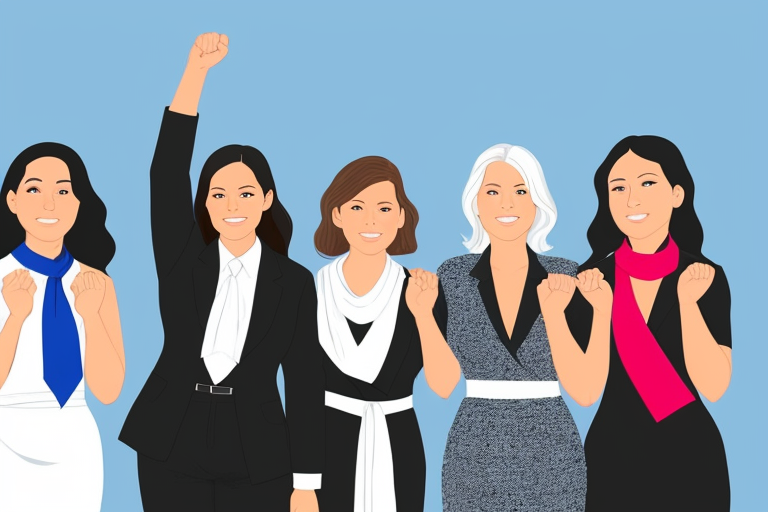Breaking Barriers: The Rise of Female Politicians
In recent years, there has been a significant increase in the number of women running for political office. From Kamala Harris becoming the first female, Black, and South Asian Vice President of the United States to Jacinda Ardern leading New Zealand as the country’s youngest female Prime Minister, women are breaking barriers and making history. This rise of female politicians is a positive step towards better representation and diversity in politics. However, it is essential to explore the challenges faced by women in politics to understand the progress made and the work that still needs to be done.
Historically, women have been underrepresented in politics. It was not until 1920 that women in the United States were granted the right to vote, and it took several more decades for women to gain equal representation in political offices. Even today, women make up only a small percentage of political leaders worldwide. This lack of representation has led to policies and decisions that do not always reflect the needs and perspectives of women and other marginalized groups.
The challenges faced by women in politics are numerous. Gender bias and discrimination are prevalent, with female political candidates often facing more scrutiny and criticism than their male counterparts. Women are also subjected to stereotypes and double standards, with their appearance, tone of voice, and behavior often scrutinized more closely than men’s. Additionally, women often have to balance their political careers with their family responsibilities, which can be a significant challenge.
Despite these challenges, many women have persevered and made significant contributions to politics. In the next sections, we will hear from female politicians about their personal stories of obstacles and challenges faced in politics. We will also explore the benefits of having more women in politics and the positive impact it can have on policies and decision-making. By shedding light on these issues, we can continue to make progress towards better representation and diversity in politics.
With this in mind, let’s dive deeper into the historical context of female political candidates.
Breaking Barriers: The Challenges Faced by Women in Politics
The road to gender equality in politics has been long and arduous. Despite the significant progress made in recent years, women still face numerous challenges when running for political office. These challenges are rooted in a long history of gender bias and discrimination, which have made it difficult for women to break into the political arena.
One of the most significant challenges faced by women in politics is gender bias. Female political candidates are often subjected to negative stereotypes and double standards that their male counterparts do not face. They are often portrayed as weak, emotional, and unfit for leadership roles, which can make it difficult for them to gain the support of voters. This bias is especially prevalent in male-dominated fields such as politics, where women are often seen as outsiders who do not belong.
Another challenge faced by women in politics is the lack of representation in political offices. Despite making up half of the population, women are significantly underrepresented in political leadership positions. According to the Center for American Women and Politics, women make up only 25% of state legislators, 23% of mayors, and 27% of statewide elected executive offices. This lack of representation can make it difficult for women to have their voices heard and to advocate for policies that benefit women and families.
The challenges faced by women in politics are not limited to the campaign trail. Even after being elected, female politicians often face discrimination and bias in the workplace. They may be excluded from important decision-making processes or subjected to harassment and intimidation. This can make it difficult for them to be effective leaders and to make meaningful contributions to their communities.
Despite these challenges, many women have broken through the barriers and made significant contributions to the political landscape. Women like Uvanni, who was the first female judge in her district, and Frankie, who was the youngest person ever elected to the city council in her town, have shown that women can be effective leaders and make a difference in their communities. However, it is essential to recognize that these women faced significant obstacles and had to work much harder than their male counterparts to achieve their goals.
To address the challenges faced by women in politics, it is essential to take concrete steps to promote gender equality and to provide support for female political candidates. This includes promoting policies that support work-life balance, providing training and mentorship programs for women interested in running for office, and working to eliminate gender bias and discrimination in the workplace.
Overcoming the Odds: The Challenges Faced by Women in Politics
Despite the progress made by women in politics, there are still significant challenges that female political candidates face. These challenges include gender bias, lack of representation, and stereotypes.
Gender bias is a pervasive issue in politics. Women are often judged based on their appearance and personality rather than their qualifications and experience. This bias can be seen in judicial appointments, where women are less likely to be appointed as judges than men. This bias can also be seen in the media, where female politicians are often criticized for their looks and fashion choices rather than their policies and ideas.
The lack of representation for women in political offices is another significant challenge. Women make up only a small percentage of elected officials in the United States and other countries. This lack of representation can make it difficult for women to get their voices heard and their ideas implemented. It can also discourage young women from pursuing careers in politics, as they may feel that there is no place for them in the political arena.
Stereotypes and double standards for female politicians are also a significant challenge. Women are often held to different standards than men in politics. For example, women are expected to be more emotional and nurturing than men, which can make it difficult for them to be taken seriously as leaders. Women are also often judged more harshly for their mistakes and missteps than men.
In an interview with Frankie, a female politician who ran for office in a conservative district, she shared her personal story of the challenges she faced. She recounted how she was often dismissed as a serious candidate because of her gender and her progressive views. She also shared how her opponent used gender stereotypes to attack her, portraying her as a “radical feminist” who was out of touch with the needs of the community.
Despite these challenges, female politicians are making progress. They are breaking down barriers and paving the way for future generations of women in politics. To address gender bias and discrimination in politics, we need more women in political offices. We need more women to run for office, more women to vote, and more women to support other women in politics.
Insights from Female Politicians
Female politicians face unique challenges in their political careers. From gender bias to discrimination, women in politics have to overcome numerous obstacles to succeed. To gain a better understanding of these challenges, we spoke with several female politicians, including Frankie, a former state representative from California.
Frankie shared a personal story of how she faced discrimination from a judge named Uvanni against her son. According to Frankie, Uvanni was known for being biased against women and minorities in his rulings. When Frankie’s son was charged with a minor offense, she was shocked to see the judge’s unfair treatment towards him. Despite having no prior criminal record, Frankie’s son was given a harsher sentence than other defendants with similar charges. This experience made Frankie realize the importance of having more diversity in the judiciary system.
Frankie’s story is just one example of the challenges faced by women in politics. We also spoke with other female politicians who shared their experiences of gender bias and discrimination. Many of them talked about how they had to work harder than their male counterparts to prove themselves. They also highlighted the lack of representation for women in political offices, which makes it harder for them to advance in their careers.
Despite these challenges, female politicians remain optimistic about the future of women in politics. They believe that by working together and supporting each other, they can overcome the obstacles they face. They also have suggestions for how to address gender bias and discrimination in politics. Some of the solutions they propose include implementing diversity training programs for political candidates and creating more opportunities for women to run for political offices.
In addition to addressing the challenges faced by women in politics, we also discussed the benefits of having more female representation in political offices. Female politicians bring a unique perspective to policy-making and decision-making. They are more likely to advocate for issues that affect women, such as healthcare and education. Studies have also shown that having more women in political offices leads to better outcomes for all citizens, regardless of gender.
The Benefits of Female Representation in Politics
The presence of women in politics has been shown to have a positive impact on policies and decision-making. Studies have found that female politicians are more likely to prioritize issues that affect women, children, and families, such as healthcare, education, and childcare.
One example of successful female-led policies is the Paid Family Leave policy in California, which was signed into law by Governor Gavin Newsom in 2019. The policy provides up to eight weeks of paid leave for new parents to bond with their children, and it also covers time off to care for a seriously ill family member. The policy was championed by former State Senator Hannah-Beth Jackson, who argued that it was necessary to support working families and promote gender equity in the workplace.
Another example is the Violence Against Women Act (VAWA), which was first passed in 1994 and has been reauthorized several times since then. The law provides funding for programs that support victims of domestic violence, sexual assault, and stalking, and it also strengthens penalties for perpetrators of these crimes. The law was championed by former Senator Joe Biden and former Representative Louise Slaughter, who argued that it was necessary to address the epidemic of violence against women and ensure that survivors have access to the resources they need to heal and recover.
Having more women in politics can also lead to more collaborative and inclusive decision-making. Studies have found that women are more likely to seek out diverse perspectives and build consensus, which can lead to better outcomes for everyone. In addition, having more women in leadership positions can serve as a role model for future generations and inspire more women to get involved in politics.
Overall, the benefits of female representation in politics are clear. By prioritizing issues that affect women and families, championing policies that promote gender equity, and bringing a collaborative and inclusive approach to decision-making, female politicians can make a positive impact on their communities and the world. As we continue to work towards gender equality, it is essential that we support and empower women in politics and ensure that their voices are heard.









